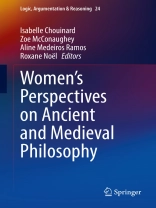This book promotes the research of present-day women working in ancient and medieval philosophy, with more than 60 women having contributed in some way to the volume in a fruitful collaboration. It contains 22 papers organized into ten distinct parts spanning the sixth century BCE to the fifteenth century CE.
Each part has the same structure: it features, first, a paper which sets up the discussion, and then, one or two responses that open new perspectives and engage in further reflections. Our authors’ contributions address pivotal moments and players in the history of philosophy: women philosophers in antiquity, Cleobulina of Rhodes, Plato, Lucretius, Bardaisan of Edessa, Alexander of Aphrodisias, Plotinus, Porphyry, Peter Abelard, Robert Kilwardby, William Ockham, John Buridan, and Isotta Nogarola.
The result is a thought-provoking collection of papers that will be of interest to historians of philosophy from all horizons. Far from being an isolated effort, thisbook is a contribution to the ever-growing number of initiatives which endeavour to showcase the work of women in philosophy.
Table des matières
Part 1. Women Philosophers in Antiquity.- 1. Women Philosophers in Antiquity: Open Questions and Some Results (Maddalena Bonelli).- 2. Women Philosophers in Antiquity and the Reshaping of Philosophy (Katharine R. O’Reilly).- Part 2. The Riddles of Cleobulina of Rhodes.- 3. Cleobulina of Rhodes and the Philosophical Power of Riddles (Mariana Gardella Hueso).- 4. The Riddles of Cleobulina: A Response to Mariana Gardella Hueso’s “Cleobulina of Rhodes and the Philosophical Power of Riddles” (Anna Potamiti).- Part 3. Women in Plato’s
Republic and
Statesman.- 5. What Happened to the Philosopher Queens? On the “Disappearance” of Female Rulers in Plato’s
Statesman (Annie Larivée).- 6. Women and Childrearing in the
Republic (Emily Fletcher).- Part 4. Lucretius on Women’s Sexuality.- 7. Sexual Freedom and Feminine Pleasure in Lucretius (Julie Giovacchini).- 8. An Epicurean Community of Women: A Response to Julie Giovacchini (Natania Meeker).- Part 5. Bardaisan of Edessa and Alexander of Aphrodisias on Fate, Nature, and Freedom.- 9. Destiny, Nature and Freedom According to Bardaisan and Alexander of Aphrodisias: An Unknown Aspect of the Controversy Against Determinism (Izabela Jurasz).- 10. How to Limit Fatalism? A Comparison Between Alexander of Aphrodisias and Bardaisan (Isabelle Koch).- 11. Bardaisan of Edessa on free will, Fate, and Nature: Alexander of Aphrodisias, Origen, and Diodore of Tarsus (Ilaria L. E. Ramelli).- Part 6. Plotinus and Porphyry on Women.- 12. Plotinus and Porphyry on Women’s Legitimacy in Philosophy (Mathilde Cambron-Goulet and François-Julien Côté-Remy).- 13. Soul, Gender and Hierarchy in Plotinus and Porphyry: A Response to Mathilde Cambron-Goulet and François-Julien Côté-Remy’s “Plotinus and Porphyry on Women’s Legitimacy in Philosophy” (Jana Schultz).- 14. Women and Philosophy in Porphyry’s
Life of Plotinus (Alexandra Michalewski).- Part 7. The Concept of Nature in Peter Abelard.- 15. Abelard’s
Homo Intelligitur Puzzle: On the Relation Between Universal Understandings and a World of Singulars (Roxane Noël).- 16. Some Further Remarks on Abelard’s Notion of Nature (Irene Binini).- Part 8. Robert Kilwardby on Bodily Pain.- 17. Does Bodily Pain have an Intentional Character? Robert Kilwardby’s Answer (Elena Băltuță).- 18. Scaring Away the Spectre of Equivocation: A Comment (Sonja Schierbaum).- Part 9. John Buridan and William Ockham on craft.- 19. Is ars an Intellectual Virtue? John Buridan on Craft (Aline Medeiros Ramos).- 20. William Ockham on Craft: Knowing how to Build Houses on the Canadian Shield (Jenny Pelletier).- Part 10. Eve’s sin in Isotta Nogarola.- 21. The Fruit of Knowledge: To Bite or not to Bite? Isotta Nogarola on Eve’s sin and its Scholastic Sources (Marcela Borelli, Valeria A. Buffon and Natalia G. Jakubecki).- 22. Why Eve Matters in the History of Feminist Arguments (Marguerite Deslauriers).
A propos de l’auteur
Isabelle Chouinard is a Ph D candidate in philosophy at the Université de Montréal and the Centre Léon Robin (Sorbonne Université) under the joint supervision of Louis-André Dorion and Jean-Baptiste Gourinat. Her dissertation examines the Stoic reception of ancient Cynicism. Her main areas of research include Socratic and Hellenistic schools of philosophy, especially Cynicism, Cyrenaic hedonism and Stoicism. She teaches ancient Greek at the Université de Montréal.
Zoe Mc Conaughey is agrégée in philosophy; Ph D student at the Université de Lille (France) and the Université du Québec à Montréal (Canada), she will defend in 2021 her dissertation entitled “Aristotle. Science and the dialectician’s activity.” Her research deals with history and philosophy of logic, thus encompassing both historical issues, especially Aristotelian logic and epistemology, and logical issues, in particular dialogical logic. She is co-author of Immanent Reasoning or Equalityin Action (Springer, 2018), with Shahid Rahman, Ansten Klev and Nicolas Clerbout.
Aline Medeiros Ramos is an instructor (chargée de cours) in philosophy at the Université du Québec à Trois-Rivières, in Canada. She is also a Ph D candidate in philosophy at the Université du Québec à Montréal, currently writing her dissertation under the supervision of Claude Panaccio on the intellectual virtues according to John Buridan. In addition to specializing in medieval philosophy focusing on the late Middle Ages, she is also generally interested in ethics and, in particular, virtue theory.
Roxane Noël is a Gates scholar currently writing her Ph D thesis at the University of Cambridge under the supervision of John Marenbon. She specializes in medieval philosophy, with a special focus on the twelfth century. Her M.A. thesis, titled “Understanding universals in Abelard’s Tractatus de intellectibus: The notion of ‘nature’”, was written under the supervision of Jack Zupko, at the University of Alberta, with support from SSHRC and FRQSC.












